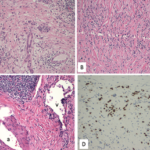 The ACR and the European League Against Rheumatism (EULAR) jointly endorsed the first classification criteria for IgG4-related disease (IgG4-RD), published in the January 2020 issue of Arthritis & Rheumatology. The criteria were authored by a steering committee representing a multispecialty group of 86 investigators from North America, Europe and Asia. The criteria were presented in draft form at the 2018 ACR/ARHP Annual Meeting in Chicago. The published criteria are a significant milestone for a disease that was recognized as a distinct condition only 15 years ago.
The ACR and the European League Against Rheumatism (EULAR) jointly endorsed the first classification criteria for IgG4-related disease (IgG4-RD), published in the January 2020 issue of Arthritis & Rheumatology. The criteria were authored by a steering committee representing a multispecialty group of 86 investigators from North America, Europe and Asia. The criteria were presented in draft form at the 2018 ACR/ARHP Annual Meeting in Chicago. The published criteria are a significant milestone for a disease that was recognized as a distinct condition only 15 years ago.
The criteria were developed primarily to identify patients for inclusion in clinical trials and other studies, and are not intended for diagnostic use in clinical practice. Strong emphasis was placed on achieving the highest possible specificity, with the result that some patients with clinical diagnoses of IgG4-RD, particularly those with disease that affects only organs infrequently involved in IgG4-RD, will not fulfill the classification criteria.
“If the appropriate clinical diagnosis for a patient is IgG4-RD, then failure to fulfill the ACR/EULAR classification criteria should not prevent the management of that patient’s condition accordingly,” the investigators write in the paper.
Multi-Organ Disease
Rheumatologists worldwide now recognize IgG4-RD as an immune-mediated, multi-organ disease that causes fibroinflammatory lesions with myriad clinical presentations. Although it is characterized by distinctive clinical, serological, radiological and pathological findings, IgG4-RD is often confused with malignancy, infection or other immune-mediated conditions, such as Sjögren’s syndrome, pancreatic cancer, granulomatosis with polyangiitis, giant cell arteritis or systemic lupus erythematosus. IgG4-RD tends to affect middle-aged to elderly individuals and often causes severe damage to the pancreas, making glucocorticoids a suboptimal therapy for this condition. IgG4-RD can affect virtually any organ, but it most often damages the major salivary glands, orbits and lacrimal glands, pancreas and biliary tree, lungs, kidneys, aorta and retroperitoneum, meninges and thyroid gland.
Generalists and specialists of every kind may see patients with IgG4-RD, but rheumatologists are the most likely specialists to treat these patients. “Rheumatologists are among the few medical specialists who have a great interest in multi-organ diseases,” explains John H. Stone, MD, MPH, director of clinical rheumatology at Massachusetts General Hospital, Boston, and co-author of the criteria.
Classification Criteria
The variable nature of IgG4-RD presentation means that no single set of classification criteria can include all patients with the disease. Likewise, although clinical, serologic, radiologic and pathologic features all contribute to the classification of IgG4-RD, none of these approaches alone allow for accurate classification of patients. For these reasons, the criteria use a multi-step process that incorporates data from all four domains to classify patients with IgG4-RD.


